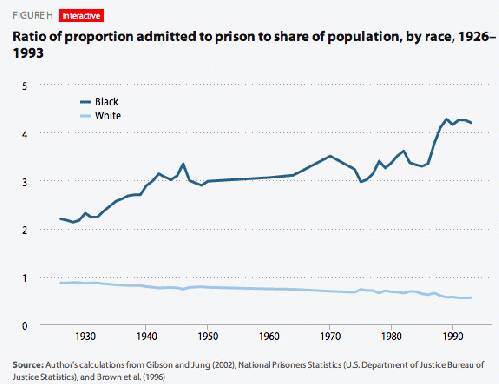Reprinted from www.epi.org
On the surface, crime and punishment appear to be unsophisticated matters. After all, if someone takes part in a crime, then shouldn't he or she have to suffer the consequences? But dig deeper and it is clear that crime and punishment are multidimensional problems that stem from racial prejudice justified by age-old perceptions and beliefs about African Americans. The United States has a dual criminal justice system that has helped to maintain the economic and social hierarchy in America, based on the subjugation of blacks, within the United States. Public policy, criminal justice actors, society and the media, and criminal behavior have all played roles in creating what sociologist Loic Wacquant calls the hyperincarceration of black men. But there are solutions to rectify this problem.
To summarize the major arguments in this essay, the root cause of the hyperincarceration of blacks (and in particular black men) is society's collective choice to become more punitive. These tough-on-crime laws, which applied to all Americans, could be maintained only because of the dual legal system developed from the legacy of racism in the United States. That is, race allowed for society to avoid the trade-off between societies "demand" to get tough on crime and its "demand" to retain civil liberties, through unequal enforcement of the law. In essence, tying crime to observable characteristics (such as race or religious affiliation) allowed the majority in society to pass tough-on-crime policies without having to bear the full burden of these policies, permitting these laws to be sustained over time.
What's more, the history of racism, which is also linked to the history of perceptions of race and crime, has led society to choose to fight racial economic equality using the criminal justice system (i.e., incarceration) instead of choosing to reduce racial disparities through consistent investments in social programs (such as education, job training, and employment, which have greater public benefits), as King (1968) lobbied for before his assassination. In other words, society chose to use incarceration as a welfare program to deal with the poor, especially since the underprivileged are disproportionately people of color.
At the same time, many communities attempted to benefit economically from mass incarceration by using prisons as a strategy for economic growth, making the incarceration system eerily similar to the system of slavery. Given all of the documented social and economic costs of mass incarceration (e.g., inferior labor market opportunities, increases in the racial disparity in HIV/AIDS, destruction of the family unit), it can be concluded that it has helped to maintain the economic hierarchy, predicated on race, in the United States. In order to undo the damage that has been done, and in order to move beyond our racial past, we must as a nation reeducate ourselves about race; and then, as a society, commit to investing in social programs targeted toward at-risk youth. We must also ensure diversity in criminal justice professionals in order to achieve the economic equality that King fought for prior to his death. Although mass incarceration policies have recently received a great deal of attention (due to incarceration becoming prohibitively costly), failure to address the legacy of racism passed down by our forefathers and its ties to economic oppression will only result in the continued reinvention of Jim Crow.





